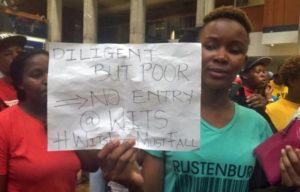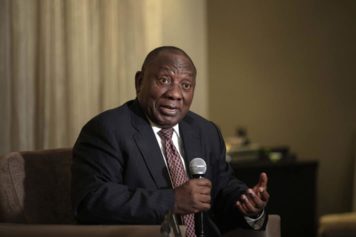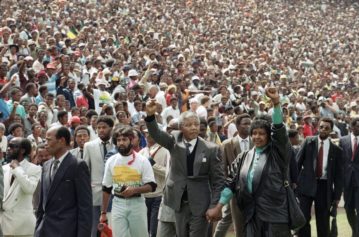
16 October 2015: Wits University students spent three days protesting over the proposed 10.5 hike in tuition fees for 2016. They remained steadfast in their “no increase” campaign until an agreement was reached on the same. Photo: eNCA.com / Lenyaro Sello
In what is being characterized as a defining moment in South African higher education, a student protest took place at a major university to suspend a planned fee increase. Just one of several institutions that have experienced protests, the events provide a window to understanding the difficulties facing students in that nation, and the greater tensions over race and economics in the society.
At the University of the Witwatersrand, students protested for three days this past week in light of a proposed 10.5 percent tuition hike, which amounted to a total of R10,000 in registration fees (US$758), as reported by eNCA.com. The three-day mass protest began on Wednesday when students blocked the entrance to the institution and shut down the campus.
VIDEO: students resolute demanding council members come down to speak to them #WitsFees #Wits @eNCA pic.twitter.com/5GxnXZM6XS
— Lenyaro Sello (@lenyarosello) October 19, 2015
#WitsFees #Wits inside Senate House students continue to sing @eNCA pic.twitter.com/PTK4oaymXM
— Lenyaro Sello (@lenyarosello) October 19, 2015
#Wits @eNCA pic.twitter.com/c80NRTkY3P
— Lenyaro Sello (@lenyarosello) October 16, 2015
The university’s Vice Chancellor, Professor Adam Habib, addressed the students, who were insistent all they would hear was a statement there would be no fee increase.
“They have raised it with me and I have said I do not have the authority to make that decision,” Habib said, placing his return to Durban for a higher education summit on hold. The university Council chair, Dr. Randall Carolissen, and other Council members finally agreed to meet students at 7 p.m.
Staff were locked in on Friday as Wits University management and students negotiated for 21 hours, eventually coming to an agreement to suspend the fee hike for the coming year. As a part of the agreement, negotiations on fee increases would start anew, and the university cannot revert back to its initial decision in the event negotiations break down. Further, the university was set for closure on Monday to allow the university council to report back to the University assembly, as all academic activities were suspended. Finally, no disciplinary action would be taken against any workers or students who participated in the protests.
The issue for the student protesters was the lack of affordability of higher education, as most students are from low income families. Mmusi Maimane, leader of Democratic Alliance, an opposition party to the African National Congress, said the government has failed to provide adequate funding for universities, and Higher Education and Training Minister Blade Nzimande should address the crisis and spend less time on “internal politics,” as eNCA.com reported.
“Access to higher education is a critical element in being able to equip young South Africans to take advantage of opportunities and build a better future for themselves,” Maimane said in a statement. “The DA welcomes the decision taken by Wits University to suspend its decision to hike fees, pending further negotiations. This, however, will not fix the ANC government’s failure to provide adequate funding to our nation’s universities, which is at the heart of these protests.”
The opposition leader added that universities did not receive adequate funding from the government’s higher education department, and the National Student Financial Aid Scheme (NSFAS) –which should be funding every poor South African student accepted to college– was short of R51 billion. Maimane suggested “the ANC demonstrates that it doesn’t care about poor students and equipping them with what they need to find employment.”
“The truth is that students should be protesting outside the office of minister Blade Nzimande himself. The funding of higher education in South Africa is in a mess, and is only serving to make life even more difficult for the country’s youth who are bearing the brunt of a sluggish economy and a lack of job opportunities,” he said, highlighting the need for South African President Jacob Zuma to create opportunities for young South Africans and expedite the higher education task team to find extra funding for higher education.
On Thursday, addressing the National Summit on Higher Education, Deputy President Cyril Ramaphosa said college tuition should more affordable.
“Students’ fees need to be affordable to allow for greater access to the poor, working class and even middle class families,” he said.
In a statement, Linda Jarvis, chief financial officer of Wits University, said the 5 percent subsidy it receives from the government is not enough to cover costs.
“We have to make up our income to cover our expenditure in order to remain sustainable. If we do not do so, we put the quality of our academic project at risk,” she said.
The registration fee at Wits—R9,900–is even lower than other institutions such as University of Cape Town (R24,000)–where a statue of Cecil John Rhodes was defaced and later removed amid a national movement calling for the removal of colonial statues. Many in South Africa, including the ANC Youth League, have been calling for free university education.
Two decades after the end of apartheid, racial tensions continue in South Africa, a nation which is 80 percent black, 8 percent white, 9 percent mixed-race and 3 percent Asian. Further, as the Globe and Mail reported in January, racial tensions have worsened amid economic stagnation. Economic growth of 1.4 per cent last year has been too slow to address the nation’s high unemployment rate, which is officially 25 percent but actually much higher. Citing racism, Blacks lack job opportunities in a country where whites dominate the economy and maintain privilege. Meanwhile, whites say they are persecuted and see their privilege threatened by affirmative action. Afrikaners, the descendants of the Boer settlers, have retreated into whites-only enclaves where they cling to the past and are determined to preserve apartheid-era racial practices.
According to a recent study by the South Africa-based Institute for Justice and Reconciliation, only 53 percent of white South Africans now say that apartheid was a crime against humanity, compared to 70 percent a decade ago. In contrast, 80 percent of Black South Africans think it was a crime against humanity. In another survey, 73 percent of Blacks and 44 percent of whites said the country’s Blacks and whites will never trust each other.
The ANC, which has an official policy of non-racialism, often accuses the Democratic Alliance of being a party of “white racists” as the Globe and Mail reports.


